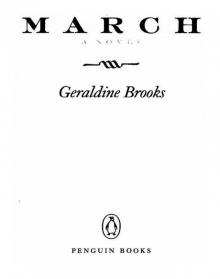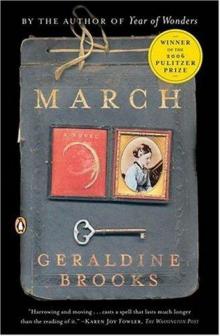- Home
- Geraldine Brooks
Year of Wonders Page 2
Year of Wonders Read online
Page 2
They were four days digging out Sam’s body. They took it straight to the sexton’s instead of bringing it home to me. They tried to keep me from it, but I wouldn’t be kept. I would do that last thing for him. She knew. “Tell them to let her go to him,” Elinor Mompellion said to the rector in that gentle voice of hers. Once she spoke, it was over. She so rarely asked anything of him. And once Michael Mompellion nodded, they parted, those big men, moving aside and letting me through.
To be sure, there wasn’t much there that was him. But what there was, I tended. That was two years ago. Since then, I’ve tended so many bodies, people I loved and people I barely knew. But Sam’s was the first. I bathed him with the soap he liked, because he said it smelled of the children. Poor slow Sam. He never quite realized that it was the children who smelled of the soap. I washed them in it every night before he came home. I made it with heather blooms, a much gentler soap than the one I made for him. His soap was almost all grit and lye. It had to be, to scrape that paste of sweat and soil from his skin. He would bury his poor tired face in the babies’ hair and breathe the fresh scent of them. It was the closest he got to the airy hillsides. Down in the mine at daybreak, out again after sundown. A life in the dark. And a death there, too.
And now it is Elinor Mompellion’s Michael who sits all day in the dark, with the shutters closed. And I try to serve him, although sometimes I feel that I’m tending just another in that long procession of dead. But I do it. I do it for her. I tell myself I do it for her. Why else would I do it, after all?
I OPEN THE DOOR to my cottage these evenings on a silence so thick it falls upon me like a blanket. Of all the lonely moments of my day, this one is always the loneliest. I confess I have sometimes been reduced to muttering my thoughts aloud like a mad-woman when the need for a human voice becomes too strong. I mislike this, for I fear the line between myself and madness is as fine these days as a cobweb, and I have seen what it means when a soul crosses over into that dim and wretched place. But I, who always prided myself on grace, now allow myself a deliberate clumsiness. I let my feet land heavily. I clatter the hearth tools. And when I draw water, I let the bucket chain grind on the stone, just to hear ragged noise instead of the smothering silence.
When I have a tallow stub, I read until it gutters. Mrs. Mompellion always allowed me to take the stubs from the rectory, and although there are very few nowadays, I do not know how I would manage without. For the hour in which I am able to lose myself in someone else’s thoughts is the greatest relief I can find from the burden of my own memories. The volumes, too, I bring from the rectory, as Mrs. Mompellion bade me borrow any book I chose. When the light is gone, the nights are long, for I sleep badly, my arms reaching in slumber for my babies’ small, warm bodies, jolting suddenly wakeful when I do not find them.
Mornings are generally much kinder to me than evenings, full as they are of birds’ songs and fowls’ clucking and the ordinary promise that comes with any sunrise. I keep a cow now, a boon that I was not in purse to have in the days when Jamie or Tom could have benefited from the milk. I found her last winter, wandering gaunt in the middle of the road, her hide draped loose upon her bony nethers. Her big eyes looked at me with such a vacant, hopeless stare that I felt I was gazing into a mirror. My neighbors’ cottage was empty, the ivy already creeping across the windows and the gray lichens crusting the sills. So I drove her inside and fitted it up as her boose, fattening her through the cold months with their oats—abundant food of which the dead had no need. She had her calf alone there, without complaint. By the time I found him I guess he had been born two hours, his back and sides dried out but still wet behind the ears. I helped him get his first drink, putting my fingers in his mouth and squirting her teat between them onto his slippery tongue. In return, the next night I stole a bit of her rich, yellow birth milk to make a beastings pie, baked with egg and sugar, and took it to Mr. Mompellion, rejoicing when he ate it as if he were my child, thinking how Elinor would be glad of it. The little bull calf is sleek now, and his mother’s brown eyes regard me with a kindly patience. I love to lean my head against her warm flank and breathe the scent of her hide as the steaming milk foams into my bucket. I carry it to the rectory to make a posset or churn sweet butter or skim the cream to serve with a dish of blackberries—whatever I think will best tempt Mr. Mompellion. When I have enough in the pail for our small needs, I turn her out to graze. She has fattened so since last winter that every day now I fear she will lodge halfway through the doorway.
Bucket in hand, I leave the cottage by the front door, for in the mornings I feel more able to meet whomever might be abroad. We live all aslant here, on this steep flank of the great White Peak. We are always tilting forward to toil uphill, or bracing backward on our heels to slow a swift descent. Sometimes, I wonder what it would be like to live in a place where the land did not angle so, and people could walk upright with their eyes on a straight horizon. Even the main street of our town has a camber to it, so that the people on the uphill side stand higher than those on the downhill.
Our village is a thin thread of dwellings, unspooling east and west of the church. The main road frays here and there into a few narrower paths that lead to the mill, to Bradford Hall, the larger farms, and the lonelier crofts. We have always built here with what we have to hand, so our walls are hewn of the common gray stone and the roofs thatched with heather. Behind the cottages on either side of the road lie tilled fields and grazing commons, but these end abruptly in a sudden rise or fall of ground: the looming Edge to the north of us, its sheer stone face sharply marking the end of settled land and the beginning of the moors, and to the south, the swift, deep dip of the Dale.
It is a strange prospect, our main street these days. I used to rue its dustiness in summer and muddiness in winter, the rain all rizen in the wheel ruts making glassy hazards for the unwary stepper. But now there is neither ice nor mud nor dust, for the road is grassed over, with just a cow-track down the center where the slight use of a few passing feet has worn the weeds down. For hundreds of years, the people of this village pushed Nature back from its precincts. It has taken less than a year to begin to reclaim its place. In the very middle of the street, a walnut shell lies broken, and from it, already, sprouts a sapling that wants to grow up to block our way entire. I have watched it from its first seed leaves, wondering when someone would pull it out. No one has yet done so, and now it stands already a yard high. Footprints testify that we are all walking around it. I wonder if it is indifference, or whether, like me, others are so brimful of endings that they cannot bear to wrench even a scrawny sapling from its tenuous grip on life.
I made my way to the rectory gate without meeting any soul. So my guard was down and I was unready to face the person who, in all the world, I least wished to see. I had entered the gate and had my back turned to the house, refastening the latch, when I heard the rustle of silk behind me. I turned suddenly, slopping milk from my bucket as I did so. Elizabeth Bradford scowled as a droplet landed on the aubergine hem of her gown. “Clumsy!” she hissed. And so I reencountered her much as I had last seen her more than one year earlier; sour-faced and spoiled. But the habits of a lifetime are hard-shed, and I had dropped into a curtsy without willing it, my body acting despite the firm resolve of my mind to show this woman no such deference.
Typically, she did not even bother with a greeting. “Where is Mompellion?” she demanded. “I have been rapping upon that door for a good quarter hour. Surely he cannot be so early abroad?”
I made my voice unctuously polite. “Miss Bradford,” I said, ignoring her question, “it is a great surprise, and an honor un-looked for, to see you here in our village. You left us in such haste, and so long since, that we had despaired of ever more being graced by your presence.”
Elizabeth Bradford’s pride was so overweening and her understanding so limited that she heard only the words and missed the tone. “Indeed.” She nodded. “My parents were well aware that our departure woul
d leave an unfillable gap here. They have always felt their obligations most keenly. It was, as you know, that sense of obligation that caused them to remove us all from Bradford Hall, to preserve the health of our family so that we could continue to fulfill our responsibilities. Surely Mompellion read my father’s letter to the parish?”
“He did,” I replied. I did not add that he had used it as an occasion to preach one of the most incendiary sermons we ever had from him.
“So, where is he? I have been kept waiting long enough already, and my business is urgent.”
“Miss Bradford, I must tell you that the rector sees no one at present. The late events in this place, and his own grievous loss, have left him exhausted and quite unequal to shouldering the burdens of the parish at this time.”
“Well, that may be, insofar as the normal run of parishioners is concerned. But he does not know that my family is returned here. Be so good as to inform him that I require to speak with him at once.”
I saw no purpose in further discourse with this woman. And I have to own that I was consumed with curiosity to see if the news of the Bradfords’ return would rouse Mr. Mompellion, or draw forth any sign of feeling. Perhaps wrath could rouse him where charity had not. Perhaps he needed to be singed by just such a brand.
I swept by her and walked on ahead to open the rectory’s great door. She pinched her face at this; she was not accustomed to sharing a doorway with servants, and I could see she had expected me to pass to the kitchen garth and then come and let her in with accustomed ceremony. Well, times had changed in the Bradfords’ absence, and the sooner she accustomed herself to the inconveniences of the new era the better.
She pushed past me and found her own way to the parlor, pulling off her gloves and flicking them impatiently against the palm of her hand. I saw the surprise in her face as she registered the bareness of the room, stripped as it was of all its former comforts. I went on to the kitchen. No matter how urgent her business, she would have to wait until Mr. Mompellion broke his fast, since that scant serving of oatcake and brawn was the only meal I knew with any certainty that he would take. She was pacing, barely able to contain herself, as I passed by some minutes later with the laden tray. I glimpsed her through the open door. Her brow was drawn so low, her scowl so deep, that she looked as if someone had grabbed her face from beneath and dragged it groundward. Upstairs, I took a minute to compose myself before I knocked on the door. I did not want to say, or look, more than I should when I announced to the rector his caller.
“Come,” he said. He was standing by the window when I entered, and the shutters, for once, were opened. His back was to me as he spoke. “Elinor would be sorry to see what has become of her garden,” he said.
I did not know at first how to answer that. To speak the evident truth—yes, indeed, she would—seemed likely only to feed his gloom. To deny his proposition would be a falsehood.
“I expect she would understand why it is so,” I said, bending to set out the dishes from his tray. “And even if we had hands enough to do the ordinary tasks—to pull the weeds and prune the deadwood—yet it would not be her garden. We would lack her eye. What made it her garden was the way she could look at a handful of tiny seeds in the bareness of winter and imagine how they would be, months later, sunlit and in flower. It was as if she painted with blooms.”
When I straightened, he had turned and was staring at me. The shock of it went through me once again.
“You knew her!” He said it as if it had only just come to him.
To cover my confusion, I blurted out what I had hoped to convey with care. “Miss Bradford is in the parlor. The family is returned to the Hall. She says she needs to speak with you urgently.”
What happened next astonished me so much that I almost dropped the tray. He laughed. A rich, amused laugh the like of which I hadn’t heard for so long I’d forgotten the sound of it.
“I know. I saw her. Banging on my door like a siege engine. Truly, I thought she meant to break it down.”
“What answer should I give her, Rector?”
“Tell her to go to Hell.”
When he saw my face, he laughed again. My eyes must have been wide as chargers. Wiping a tear of mirth from his own, he struggled for composure. “No, I see. You can barely be expected to carry such a message. Put it into whatever words you like, but convey to Miss Bradford that I will not see her, and get her from this house.”
It was as if there were two of me, walking down those stairs. One of them was the timid girl who had worked for the Bradfords in a state of dread, fearing their hard looks and harsh words. The other was Anna Frith, a woman who had faced more terrors than many warriors. Elizabeth Bradford was a coward. She was the daughter of cowards. As I entered the parlor and faced her thunderous countenance, I knew I had nothing more to fear from her.
“I am sorry, Miss Bradford, but the rector is unable to see you at present.” I kept my voice as level as I could, but as her jaw worked in that angry face, I found myself thinking of my cow worrying at her cud, and I felt the contagion of Mr. Mompellion’s strange fit of mirth. It was all I could do then to keep my composure and continue. “He is, as I said, not currently performing any pastoral duties, nor does he go into society or receive any person.”
“How dare you smirk at me, you insolent slattern!” she cried. “He will not refuse me, he dare not. Out of my way!” She moved for the door, but I was quicker, blocking her path like a collie facing down an unruly tup. We stared at each other for a long moment. “Oh, very well,” she said, picking up her gloves from the mantle as if purposing to leave. I stood aside then, meaning to show her to the front door, but instead, she pushed past me and was upon the steps to Mr. Mompellion’s room when the rector himself appeared on the landing.
“Miss Bradford,” he said, “do me the kindness of remaining where you are.” His voice was low but its jussive tone stopped her. He had shed the hunched posture of the past months and stood tall and straight. He had lost flesh, but now, as he stood there, animated at last, I could see that gauntness had not ravaged him but rather given his face a kind of distinction. There had been a time when, if you looked at him when he was not speaking, you might have called his a plain face, save for the deep-set gray eyes that were striking, always, for their expressiveness. Now, the hollowness of his cheeks called attention to those eyes, so that you could not take your gaze from them.
“I would be obliged if you would refrain from insulting members of my household whilst they are carrying out my instructions,” he said. “Please be good enough to allow Mrs. Frith to show you to the door.”
“You can’t do this!” Miss Bradford replied, but this time in the tone of a very young child who has been thwarted in its pursuit of a plaything. The rector was standing half a flight of stairs above her, so that she had to gaze up at him like a supplicant. “My mother has need of you ...”
“My dear Miss Bradford,” he interrupted coldly. “There were many people here with needs this past year, needs that you and your family were in a position to have satisfied. And yet you were not ... here. Kindly ask your mother to do me the honor of advancing the same tolerance for my absence now that your family arrogated for so long in regard to its own.”
She was flushed now, her face a blotchy patchwork. Suddenly, surprisingly, she began to cry. “My father is not any longer ... my father does not ... It is my mother. My mother is very ill. She fears ... she believes she will die of it. The Oxford surgeon swore it was a tumor but there is no question now ... Please, Reverend Mompellion, her mind is much disordered; she will take no rest and speaks of nothing but seeing you. That is why we are come back here, that you may console her and help her face her death.”
He was silent for a long moment, and I felt sure that his next words would be a request to me to look out his coat and hat so that he could go to the Hall. His face, when he spoke, was sad, as I had so often seen it. But his voice was strange and rough.
“If your mother seek
s me out to give her absolution like a Papist, then she has made a long and uncomfortable journey to no end. Let her speak direct to God to ask forgiveness for her conduct. But I fear she may find Him a poor listener, as many of us here have done.” And with that he turned his back and climbed the stairs to his room, closing the door behind him.
Elizabeth Bradford threw out a hand to steady herself and gripped the banister until bone of her knuckles showed through the skin. She was trembling, her shoulders shaking with sobs that she struggled to suppress. Instinctively, I went to her. Despite my years of aversion for her, and hers of contempt for me, she folded up into my arms like a child. I had meant to help her to the door, but she was in such a state that I could not bring myself to shove her out, though it was clearly the rector’s wish that she be gone. Instead, I found myself shepherding her to the kitchen and easing her down upon the bucket bench. There, she gave herself up so completely to sobbing that the little piece of lace she used as a handkin was soaked through. I held out a dishclout, and to my astonishment she took it and blew her nose as indelicately and unselfconsciously as an urchin. I offered her a mug of water and she drank it thirstily. “I said the family was back, but in truth it is just my mother and me and our own servants. I do not know how I can help her, she grieves so. My father will have none of her ever since he learned the truth of her condition. My mother has no tumor. But what she has, at her age, may surely kill her just the same. And my father says he cares not. He has ever been cruel to her, but now he excels himself in his wretchedness. He is saying the most terrible things ... He has called his own wife whore ...” And there she finally stopped herself. She had said more than she intended. Far more than she should. Rising from the bench as if it had suddenly turned to a hob that was blistering her noble backside, she squared her shoulders and handed me the soiled dishclout and the empty mug without a thank you. “I can find my own way out,” she said, brushing past me without a glance. I did not follow her, but I knew she was gone by the slam of the great oaken door.

 Year of Wonders
Year of Wonders People of the Book
People of the Book The Secret Chord
The Secret Chord Foreign Correspondence
Foreign Correspondence Nine Parts of Desire (Korean Edition)
Nine Parts of Desire (Korean Edition) Caleb's Crossing
Caleb's Crossing The Idea of Home
The Idea of Home Foreign Correspondence: A Pen Pal's Journey
Foreign Correspondence: A Pen Pal's Journey March
March March: a novel
March: a novel The Best American Short Stories® 2011
The Best American Short Stories® 2011 Nine Parts of Desire
Nine Parts of Desire